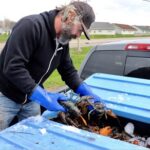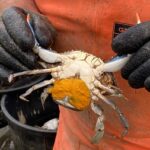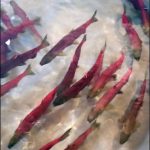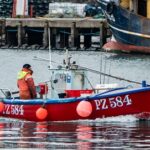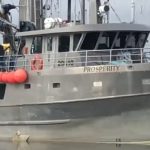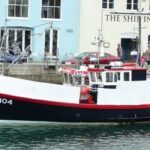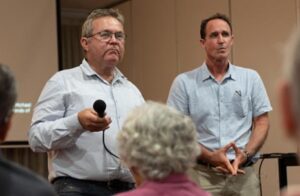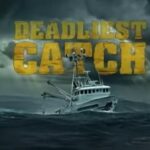Tag Archives: National Marine Fisheries Service
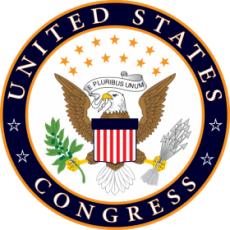
House Passes Sullivan’s American Fisheries Advisory Committee Act
U.S. Senator Dan Sullivan, a member of the Senate Commerce, Science and Transportation Committee, welcomed House passage this week of S. 497, the American Fisheries Advisory Committee Act, bipartisan legislation he introduced to create an industry-led committee to assist in the administration of fisheries marketing, research, and development grants. The Saltonstall-Kennedy (SK) Act provides funding for fisheries marketing, research, and development. These funds are derived from a portion of fishery import duties. To inform how these funds are allocated, Congress authorized a group of experts from different segments of the fishing industry to advise on commercial fishing problems and needs. Following a 1972 law, the original American Fisheries Advisory Committee was disbanded. In the committee’s absence, the National Marine Fisheries Service decides, by its own criteria, who receives grants. >click to read< 12:36
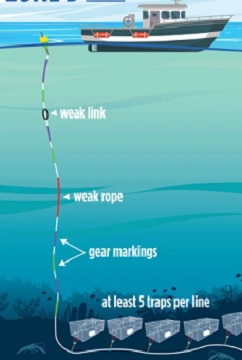
Big Story: Lobstermen fear disaster as new gear regulations take effect
Doug McLennan isn’t worried about the state of the fishery. What worries McLennan and thousands of other Maine lobstermen is the latest round of federal regulations designed to protect the endangered North Atlantic right whale, and additional measures being planned for the next decade. The newest regulations took effect Sunday, though their enforcement has been delayed until supply chain issues for some of the required gear are resolved. This is just the latest in gear regulation change required by the Atlantic Large Whale Take Reduction Plan,,, Many lobstermen have raised concerns about safety and the potential for gear failure and loss of expensive traps under the new rules, and they worry about what is coming next. >click to read< 09:16

Maine’s politicians seek delay on whale protection rules
In a letter to Commerce Secretary Gina Riamondo, Gov. Mills and other officials urge federal fisheries regulators to extend the May 1 deadline to comply with the new regulations, which are aimed at protecting critically endangered north Atlantic right whales by setting a seasonal closure and requiring modifications to gear. They are requesting a July 1 deadline. The state’s commercial fishing industry is working “in good faith” to comply with the new rules but are facing supply chain issues and other complications with less than six weeks to go until implementation of the new rules. >click to read< 17:40
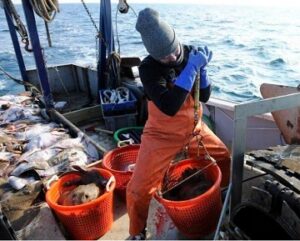
Rule change calls for monitoring of all groundfish trips – Not everyone is on board.
The most significant proposed change is a monitoring coverage target of 100% aboard eligible trips, which is higher than present monitoring levels. The change is meant to remove uncertainty surrounding catch. This and other changes, known as Amendment 23, to the Northeast Multispecies Fishery Management Plan were developed by the New England Fishery Management Council. According to a NOAA Fisheries fact sheet, the changes, if approved by NOAA Fisheries, would give groundfish vessels the choice of a human observer or using one of two types of electronic monitoring to meet the increased monitoring requirements, provided the sector has a corresponding approved monitoring plan and a contract with an approved service provider. >click to read< 12:37

Maine lobster industry fights lawsuit that aims to shut down fishery
While Maine’s lobster industry has been fighting an offensive legal battle against impending rules to protect endangered North Atlantic right whales, it also is playing defense in a case brought by environmentalists that seeks to shut down the lobster fishery entirely. Lobster industry groups are intervening in a case brought in Washington, D.C.’s U.S. District Court by the Center for Biological Diversity and other plaintiffs that argues the new federal restrictions aren’t adequate, and that the fishery’s continued operation poses an existential threat to the whales. >click to read< 19:15

Gulf of Maine: Lawsuits over North Atlantic right whale regulations coming to boil
Lobsterman Brian Cates lives so far at the edge of Maine he can look out the windows of his house and see Canadian boats out in Canadian waters. Cates and other New England lobstermen are worried about how the coming regulations issued by the National Marine Fisheries Service will affect their livelihoods. Cates fishes in disputed waters. There, around the mouth of the Bay of Fundy, there’s a strip of ocean claimed by both Canada and U.S. alike called the grey zone. Cates fishes up against Canadian lobstermen, their traps and lines often getting caught up on one another. And the rules coming down from the federal government are not helping, >click to read< 19:14
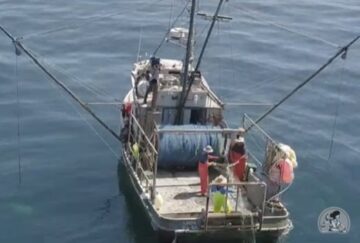
Judge advances lawsuit over California drift gillnet ban
A federal judge has advanced a lawsuit against a California state law that bans the use of swordfish catching gillnets,,, Two fishermen sued the state two years ago, arguing that because they obtained federal permits to use gillnets, California cannot pass a law that deprives them of those federal rights. The fishermen, Joseph Abad and Austen Brown, asked for a preliminary injunction to block enforcement of the state law, but a federal judge denied that request. >click to read< 10:17
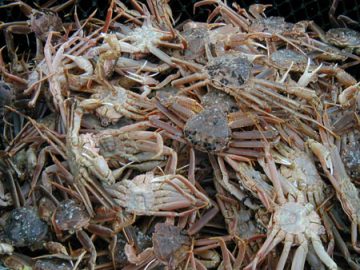
Bering Sea snow crab deemed ‘overfished’
After a sudden decline in the stock last year, federal managers have officially designated Bering Sea snow crab as overfished and are working on a plan to rebuild the stock. In October, the National Marine Fisheries Service determined that with its current low numbers, the stock of Bering Sea snow crab, also known as opilio crab, is officially overfished. However, the stock is “not subject to overfishing,” according to a report submitted to the North Pacific Fishery Management Council on the issue. That’s because the fishery removals aren’t above the level considered to be sustainable, rather it’s because the stock dropped for other reasons that scientists and managers aren’t entire sure of yet. >click to read<
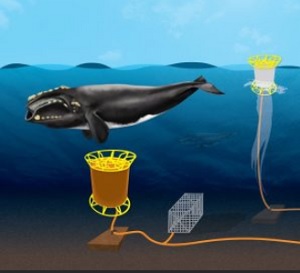
South Atlantic: NMFS accepting input on “ropeless” black sea bass pots
The National Marine Fisheries Service is accepting comments on an application for an exempted fishing permit from Sustainable Seas Technology Inc. The applicant proposes deploying modified black sea bass pots with acoustic subsea buoy retrieval systems in federal waters off North Carolina, South Carolina, Georgia and northeastern Florida. Adaptation of “ropeless” systems for this style of pot fishing could reduce risk to these whales and other marine animals that suffer entanglements, according to the applicant. >click to read< 09:56 fixed gear

North Atlantic Right Whale: Extinction Is Looming. Everyone’s Fighting.
This May, new rules created for the lobster industry by the National Marine Fisheries Service will become official policy for boats operating in right whale territory. The agency estimates that lobster and Jonah crab traps are responsible for 95 percent of vertical end-line ropes in the areas where whale protections apply and therefore pose the most risk for entangling whales. The Fisheries Service says these changes will reduce the risk of death and serious injury by 69 percent. But in the months after the rules were finalized, the agency has seen pushback from conservation groups, who argue the new protections aren’t enough, and lobster fishing crews, who say the rules will harm their business. >click to read< 14:22

Lawsuit filed to Protect Pacific Humpback from fishing gear, Can lawsuits save North Atlantic Right Whale?
The Center for Biological Diversity sued the National Marine Fisheries Service today for failing to protect endangered Pacific humpback whales from deadly entanglements in sablefish pot gear off the coasts of California, Oregon and Washington. According to Fisheries Service estimates, the sablefish fishery on average kills or seriously injures about two humpback whales every year. The fishery uses 2-mile-long strings of 30 to 50 pots. >click to read< Can Litigation Help Save the North Atlantic Right Whale From Extinction? – As conservation organizations and governments around the globe grapple with the devastating effects of climate change and overexploitation, the legal battle fought over the critically endangered North Atlantic right whale, one of the world’s most endangered large whale species, may provide insights into how litigation can help, or hinder, efforts to save species from extinction. >click to read< 13:41
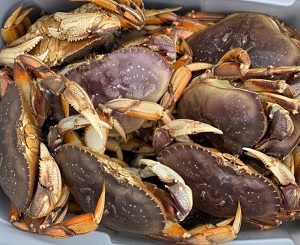
Shortened Dungeness crab season reflects industry uncertainty
Commercial crabbers have made quick work of this year’s Dungeness crab harvest, bringing substantially fewer crustaceans ashore with each lift. The haul has been so meager that even those who ply the waters south of Mendocino County,,, Closures and major catch restrictions in Alaskan crab fisheries, where king and snow crab stocks have plummeted, has heightened demand this winter for the Dungeness crab caught off Central and Northern California. “The thing that’s saving us is the price,” said Dick Ogg, “We’re down to two or three crabs per pot,” said Bodega Bay fisherman Tony Anello, one of many getting ready to pack it in. (Then the conversation of ropeless fishing begins,,,) >Click to read< – Campaigners say ropeless technology could spare whales in the Firth of Forth >click to read< 09:28
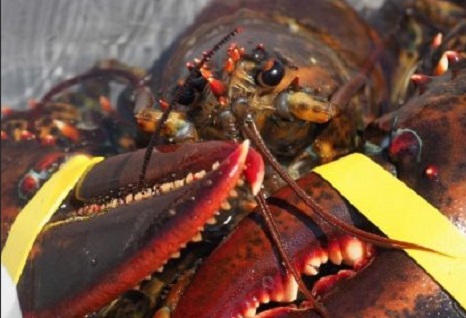
Maine’s lobster industry is in a fight for its survival
In October, a U.S. District Court judge in Bangor had ruled that there was reason to question the federal government’s decision to close this prime lobstering area for four months this winter. When an appeals court overturned this decision in November, lobstermen who had already set traps in this area were forced to dangerously hurry and take them up, creating economic hardship for those who invested in gear, rigged up and were already fishing in these productive waters. For Maine’s lobster industry, this is another frustrating example of one step forward, two steps back. This latest court ruling, however, is just the tip of the iceberg that threatens to sink the fishery. >click to read< 09:57

Judge rejects efforts by feds, enviro’s to impose immediate restrictions on lobstering
Last month, Justice Lance Walker sided with the Maine Lobstering Union and granted a temporary injunction to stop a new federal closure of a roughly 960-square mile area off the Maine coast. The federal agencies appealed that decision and asked for an emergency “stay” of the order, contending the closure is essential now to protect endangered right whales. On Friday, Justice Walker denied that request, meaning the area remains open to fishing. >click to read< 16:10
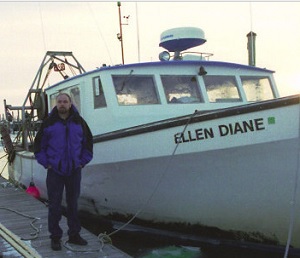
A grievous assault on the lobster resource
In recent years, the federal government in the form of the National Marine Fisheries Service has been expanding restrictions on fin fishermen throughout the U.S.,, The federal government allows each (lobster) fishermen a maximum of 800 traps when fishing in federal waters,,, I take no pleasure in writing this, but as a former New England Fishery Management council member, I feel bound to report a grievous assault on the lobster resource even though the council does not manage lobsters. The goal of writing the article is for the public to apply political pressure to force a solution. I realize that by submitting this request/complaint that I am opening myself up to possible retaliation on the water. I ask both the reader and bureaucracy to keep that in mind. >click to read< By David Goethel 10:30

Feds, con groups file appeal to reinstate seasonal lobstering ban
In their appeal, the federal government and the conservation groups, the Center for Biological Diversity, the Conservation Law Foundation and the Defenders of Wildlife, argue that not only did the National Marine Fisheries Service use the best available science, but also that the lobstering groups did not present any actual evidence of the “certain economic harms” the judge referenced. Also in the appeal, the groups claim that the plaintiffs’ criticism of the availability and quality of data to support the restrictions is misplaced. The fisheries service admitted that more data would be beneficial to refine the agency’s understanding of right whale distribution, but it argued that the data already available is sufficient. >click to read< 08:02
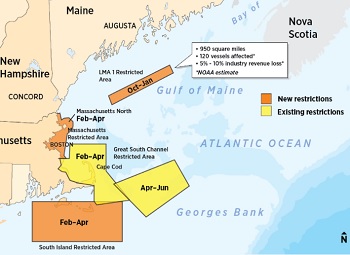
Gulf of Maine: Whale scientists fire back – Marine biologists disagree with a judge’s decision
Lobster industry professionals, elected officials and now a federal judge have expressed doubts as to whether the National Marine Fisheries Service used the best available science in imposing the closure, and whether the whales even frequent the area. They all argue that the statistical modeling used by federal regulators leaves much to be desired. Sean Todd, a marine biologist and director of Allied Whale, a marine mammal research group located at the College of the Atlantic in Bar Harbor, disagrees with both the decision to block the closure and the claim that there are insufficient data to justify it. >click to read< 09:27
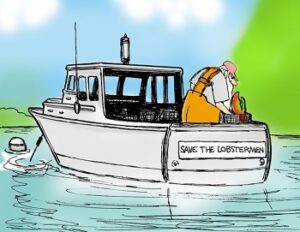
Opinion: Federal rules are sinking Maine’s lobster industry
As a lifelong Maine lobsterman, I understand the inherent dangers of my job. I keep watch on the forecast knowing that sudden weather changes can make the difference between a successful day at work and putting my crew’s life at risk. These days, however, the hazard posed by Mother Nature does not compare with the perfect storm of regulations coming out of Washington that threaten my job, our way of life and may eventually sink a fishery that has supported communities and generations of families here in Maine. By Kristan Porter >click to read< 15:18

Delegation, Mills Urge Commerce Secretary to Rescind Right Whale Rule and Protect Lobster Fishery
Following the U.S. District Court of Maine’s order blocking the Lobster Management Area (LMA) 1 restricted area closure, which is a component of the National Marine Fisheries Service’s flawed and unfair Atlantic Large Whale Take Reduction Rule, U.S. Senators Susan Collins and Angus King, Representatives Chellie Pingree and Jared Golden, and Governor Janet Mills sent a letter to Commerce Secretary Gina Raimondo. In their bipartisan letter, the Maine Delegation and Governor Mills applauded the U.S. District Court of Maine’s decision halting the enforcement of the LMA 1 closure and urged Secretary Raimondo to use her authorities to immediately resolve the rule’s many shortcomings. >click to read< 09:16
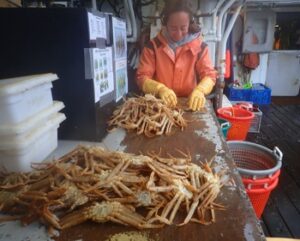
Faced with crashing crab stocks, council looks to swiftly analyze closures and trawl impacts
As crab fishermen face a dire season in Western Alaska this year, the North Pacific Fishery Management Council is looking for quick analysis and the fleet is looking for more extensive closures to protect some crab stocks. Survey data has shown an approximately 90% drop in snow crab stocks since the last survey, pushing acceptable catch limits down, while the long-term decline of Bristol Bay red king crab has led to a complete closure in the fishery for the first time since 1994. The Alaska Bering Sea Crabbers Association, the trade group that represents the majority of crab harvesters in the Bering Sea and Aleutian Islands rationalization program, has estimated a $200 million loss for the fishery. >click to read< 11:12

Sanity! Federal judge blocks lobster fishing ban in the of Gulf of Maine
A federal judge in Maine on Saturday blocked a seasonal ban on traditional lobster fishing in a stretch of offshore waters in the Gulf of Maine that regulators say is needed to save the endangered right whale from extinction. In his 28-page ruling, U.S. District Judge Lance Walker said regulators had relied on “markedly thin” statistical modeling instead of hard evidence to show the thousand-square-mile area they had planned to close was really a hot spot for the imperiled whale. While the area targeted for closure may be a viable habitat for the right whale, there is no hard proof the whales actually gather there,,, >click to read< “This victory by the Maine Lobstering Union is a significant step in protecting one of Maine’s most precious industries – lobstering,” 21:10
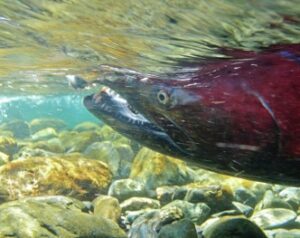
Trawler bycatch debate heats up after dismal 2021 returns
Chinook salmon returns were dismal virtually everywhere in Alaska this year, from Southeast to the Bering Sea, with few exceptions. That follows a trend, as abundance has declined over roughly the last decade. The North Pacific Fishery Management Council is debating changes in its meeting this month. Trawlers, which use weighted nets to drag either along the bottom or in midwater, are permitted a certain amount of bycatch as they fish for their target species, the largest of which is pollock. Bycatch is always a heated issue, but it is especially so now. >click to read< 07:10
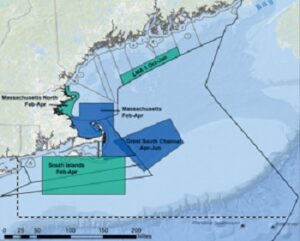
Maine Lobstering Union, lobster dealers sue over offshore closure
The union and its co-plaintiffs allege that the closure is “the product of an arbitrary and capricious agency action” and argued that the federal government’s own data showed there has not been an entanglement in Maine lobster gear for nearly 20 years. Instead, the National Marine Fisheries Service made the closure “simply to spread risk reduction responsibility across jurisdictions, without regard to the fact that lobster fishing is far more important to Maine’s economy than it is to that of any other state.” >click to read< 13:26
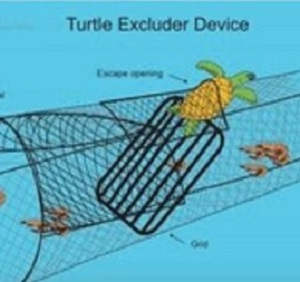
Turtle excluders
A federal court in Louisiana granted Attorney General Jeff Landry’s request to preliminarily enjoin implementation of a National Marine Fisheries Service’s rule requiring “Turtle Excluder Devices” on certain skimmer trawl boats operating in inshore waters. Landry’s office called it a “major win” for shrimpers, which were having difficulty complying with the rule due to pandemic-related supply chain issues. >click to read the order< 16:55
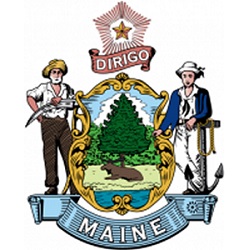
From the Office of Governor Janet T. Mills – A Letter to the Lobster Industry
In Letter to Lobster Industry, Governor Mills Calls Right Whale Rule “Extremely Disappointing” & Pledges to Work with Maine’s Congressional Delegation to Fight It. – September 1, 2021. In the wake of yesterday’s National Marine Fisheries Service’s Atlantic Large Whale Take Reduction Rule, Governor Janet Mills last night sent a letter to Maine’s lobster industry expressing solidarity with them and calling the rule “extremely disappointing”. In the letter to Maine’s lobster harvesters, dealers, and processors, Governor Mills pledges to work with Maine’s Congressional Delegation to determine the best way to address the industry’s and administration’s concerns: >click to read< 14:24
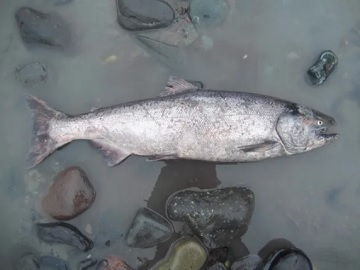
Dividing the baby
Alaska’s Kenai River is today a textbook example of the problems of managing mixed-stock fisheries right down to commercial set gillnetters protesting they catch comparatively few of the weak stock. The weak stock is in this case Chinook, or what Alaskans usually just call king salmon, and it just happens to be the same fish that gets caught as trawl bycatch in the Gulf of Alaska and the Bering Sea. To date this year, according to National Marine Fisheries Service data, trawlers in the Bering Sea have caught about 11,000 Chinook on their way to a harvest of nearly 1 million metric tons, or about 2.2 billion pounds of pollock. >click to read< 09:04

Fishermen in NCLA Video Explain the Need to Reel in NOAA’s at-Sea Monitor Rule
The New Civil Liberties Alliance released a video today outlining why it is unconstitutional to force Atlantic herring fishermen to fund government-mandated monitors at sea. It is “the equivalent of having a cop in your car who’s policing you while you drive, and you have to pay his salary out of your own pocket,” said Meghan Lapp, Fisheries Liaison & General Manager for Seafreeze, Ltd. about the rule being challenged in Relentless Inc., et al. v. U.S. Dept. of Commerce, et al. NCLA, a nonpartisan, nonprofit civil rights group, represents these private fishing companies,,, The at-sea monitor mandate, issued in 2018, is unlawfully “industry-funded.” >click to read< 08:50
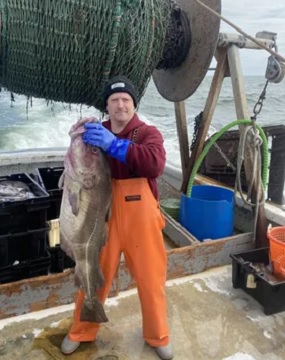
Doomed to Extinction? Where have all the codfish in the Gulf of Maine gone?!!
The commercial fishermen have all been given a personal quota for cod. If they reach their quota, they need to purchase or lease more quota from someone who has extra. The price to “lease” these fish in order to catch them can be exorbitant. Cod has become a commodity on the market being bought or hoarded by non-fishermen to make money off the backs of the active fishermen,,, And then there are the seals. Yes, harbor seals, gray seals and harp seals. Seals would not normally be feeding on large amounts of cod, but we have protected the seal population for decades without regard to the rest of the environment. The result is unmistakably a huge explosion in the seal population within the Gulf of Maine. So, are the cod doomed to extinction? >click to read< 07:50

Raimondo picks Janet Coit, a source of trusted counsel, to lead the National Marine Fisheries Service
On Monday, U.S. Secretary of Commerce Gina Raimondo, Coit’s former boss in the Rhode Island State House, announced the selection of Coit to lead the National Oceanic and Atmospheric Administration’s Fisheries office.,, But the work of the fisheries service is getting even harder as it’s faced with stepping into a brewing fight over coastal waters between fishermen and the developers of offshore wind farms. Coit wouldn’t say much about the expectations for her new job in Washington as she waited for the official word to come down from the Commerce Department. But she was certain that offshore wind will be in the mix. “That’s going to be such a hot-button issue that I’m heading into,” she said. >click to read<16:46

Herring Fishermen lose challenge to rule requiring at-sea monitors
A federal judge in Washington D.C. on Tuesday denied the bid of New Jersey-based herring fishermen who sued the National Marine Fisheries Service (NMFS) last year to block a new regulation that will require them to pay for third-party “at-sea monitors” who will survey by-catch. U.S. District Judge Emmet Sullivan ruled that the agency had not acted in violation of the MSA,,, About half-a-dozen small fishing vessel operators, including the Loper Bright Enterprise, brought the lawsuit last year. >click to read< 11:57

































